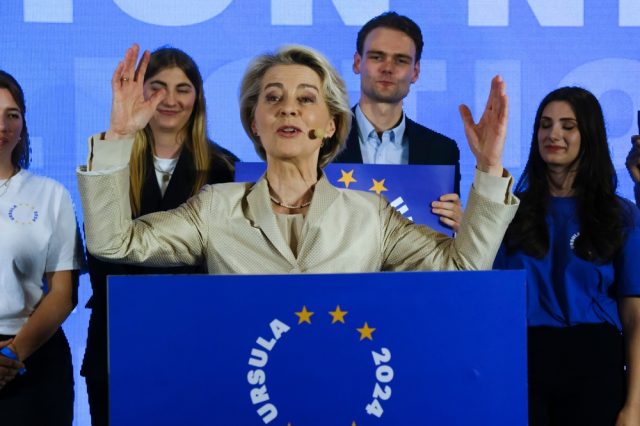
Ursula bis but without the ECR votes
The recent re-election of Ursula von der Leyen as President of the European Commission for the 2024-2029 term has sparked significant debate within the European Parliament. Her victory, ensured by the EPP-S&D-RE coalition that has held the majority of parliamentarians for some time now, was marked by electoral results that almost everywhere saw an advance of the right, increasing the feeling of “encirclement” and therefore paradoxically favoring agreements between European lefts that are more divided than ever.
The 401 votes in favor that Ursula von der Leyen (CDU, EPP) received to win the post create a historical precedent, as she is the first leader to be chosen twice by the European Parliament. Previously, only the Portuguese José Barroso (PSD, EPP) was confirmed for a second term, but for his first term he had been indicated by the European Council and not by the Parliament.
It is uncertain what von der Leyen will do next. She had previously built a close relationship with Giorgia Meloni (FdI, ECR) until the moment of the Parliament vote, only to then negotiate with the Greens for a renewed Green Deal in order to secure her re-election despite potential opposition.
All the “extremists” were excluded, including the left-wing “Mélenchonian” groups and the nationalist right. Although the left-wing groups can claim to have “halted” the right’s progress, the parties in the conservative and nationalist spheres have undergone significant changes as a result of these European elections.
Following the ID collapse, two groups emerged: Patriots for Europe (PfE) and Europe of Sovereign Nations (ESN), both strongly opposed to the re-election of von der Leyen. In the ECR, the position of Fratelli d’Italia caused a stir. While other parties in government (such as ODS in the Czech Republic) or with strong aspirations in this direction (like N-VA in Belgium) voted for von der Leyen for political opportunity, Giorgia Meloni’s party chose to vote against.
After the European vote, there was an internal change in the ECR, which for some, may have cost the conservatives an important position in the future commission. The conservative electorate has always shown aversion to the potential re-election of the Commission President, hoping for a change. This led von der Leyen to secure the votes of the Greens to avoid a negative outcome in the European Parliament.
One of the most surprising aspects of the negotiations was the support from the European Left, despite opposition from socialists and liberals, for Ursula von der Leyen’s presidency of the European Commission. This support came after von der Leyen made a strong commitment to the European Green Deal and to assisting EU countries in addressing the housing crisis. It’s likely that the election of António Costa (PS, S&D) as President of the European Council played a role in these negotiations and was also welcomed by the Macronian group of RE.
Von der Leyen has proposed reforms that include giving the European Parliament the power to propose legislation. However, some argue that this could centralize power and undermine democracy by weakening its representativeness. There are also concerns that these reforms may have negative effects on social equity within the EU, as prioritizing economic competition and growth may come at the expense of socio-environmental policies that were previously agreed upon.
Also, the policies of the European left have proven to be harmful on issues such as security and defense, which are important given the role that the European Union can play in the conflict between Russia and Ukraine.
On one hand, the re-election of Ursula von der Leyen as President of the European Commission shows that a real alternative to the established cross-party majority between the People’s Party and the Socialists has yet to be built. On the other hand, it confirms President Ursula’s profound ability to navigate complex political scenarios and secure the support of different groups.
However, it’s important to note that her term will be marked by concerns on both the left and the right about her potential impact on social welfare, environmental initiatives, and immigration policies. Her re-election underlines the need for a more inclusive and equitable approach to European governance, balancing the interests of all EU citizens.



 Subscribe
Subscribe